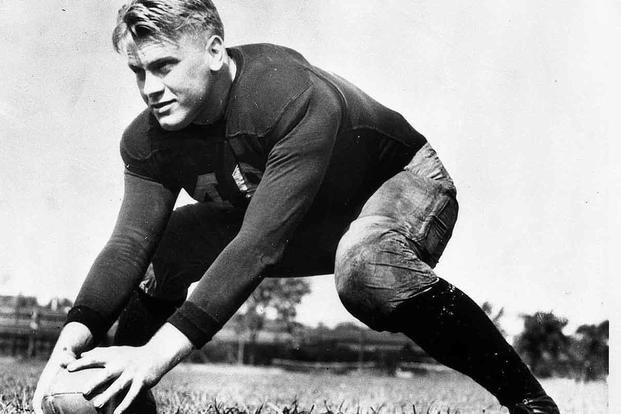The namesake of the U.S. Navy's largest and most advanced aircraft carrier, Gerald R. Ford is one of America's most underrated presidents.
Though he signed up for the Navy immediately after the attack on Pearl Harbor, he received his commission in April 1942. He spent the first years of World War II teaching naval aviators navigation, ordnance, gunnery, first aid and military drill lessons.
In 1943, Ford was assigned to the aircraft carrier Monterey as the assistant navigator, athletic officer and anti-aircraft battery officer. He saw action aboard the Monterey at places like Kwajalein, Eniwetok, the Marianas, New Guinea, Wake Island, Leyte, Mindoro and the Battle of the Philippine Sea. In 1946, he was honorably discharged and began his political career a few years later.
Presidents lead interesting lives, but here's why Gerald Ford might be a candidate for "Most Interesting Man in the World."
1. President Ford Was Born a King.
Ford's birth name was Leslie Lynch King Jr. His father, according to the former president, routinely hit his mother and once threatened to kill her with a butcher knife. She escaped to another state, where she filed for divorce and married Gerald Rudolff Ford. When Leslie King turned 25 years old, he adopted his new father's name (with a more traditional spelling).
2. No One Thought Ford Could Win in Politics.
Despite being an all-star player for the Michigan Wolverines and leading the team to two undefeated football seasons, people underestimated Ford. In his first run for the U.S. House of Representatives, even he was unsure how voters would feel about a relative newcomer who had married a divorced ex-dancer from New York City.
He won in a 2-to-1 election landslide, with the goal of one day becoming speaker of the House, which he considered the "ultimate achievement."
3. He Almost Played in the NFL.
Ford graduated from Michigan years before the Japanese attacked Pearl Harbor, and decided to go to Yale Law School -- but Yale turned him down.
In 1935, he received offers to play football for the Detroit Lions and Green Bay Packers but opted to start law school at Michigan instead. The next year, Yale admitted him, and he graduated in 1941.

4. He Was Not a Typical Politician.
In all his years in the House of Representatives, Ford never introduced a single piece of legislation. He saw himself as a negotiator first, supporting others' policies. This doesn't mean he was ineffective -- far from it. Ford helped pass civil rights legislation, the Voting Rights Act of 1965 and the 24th Amendment to the Constitution, which prohibited poll taxes for federal elections.
5. He Was Never Elected to Any Executive Office.
Ford had no ambition to be elected to the Senate, a governor's seat or even as president. He was pretty firm about his goal to be speaker of the House, but the closest he got to that post was becoming House minority leader in 1965. He pledged to retire in 1976 if Republicans couldn't take back the House.
But in 1973, Vice President Spiro Agnew was forced to resign over a bribery and tax evasion scandal. To replace him, the House of Representatives forced President Richard Nixon to elevate Ford to the office. The very next year, it was Nixon who resigned, and Ford became president of the United States.

6. His Most Controversial Decision Proved to Be His Best.
Upon taking office in 1974, one of his first acts as president was to pardon his predecessor, a decision that was popular with no one, except for maybe Nixon. But Ford believed a pardon was a presumption of guilt and the acceptance of one was a confession.
Still, his former colleagues in Congress called on him to testify in front of the House Judiciary Subcommittee, which he did. He was the first sitting president since Abraham Lincoln to testify at the House of Representatives.
History proved Ford right, even though the decision cost him the 1976 election. During his inaugural speech, President Jimmy Carter thanked Ford for his bravery in healing the nation.
In 2001, Ford received a Profile in Courage Award for his pardon from the John F. Kennedy Library.
-- Blake Stilwell can be reached at blake.stilwell@military.com. He can also be found on Twitter @blakestilwell or on Facebook.
Want to Know More About Veteran Jobs?
Be sure to get the latest news about post-military careers, as well as critical info about veteran jobs and all the benefits of service. Subscribe to Military.com and receive customized updates delivered straight to your inbox.












